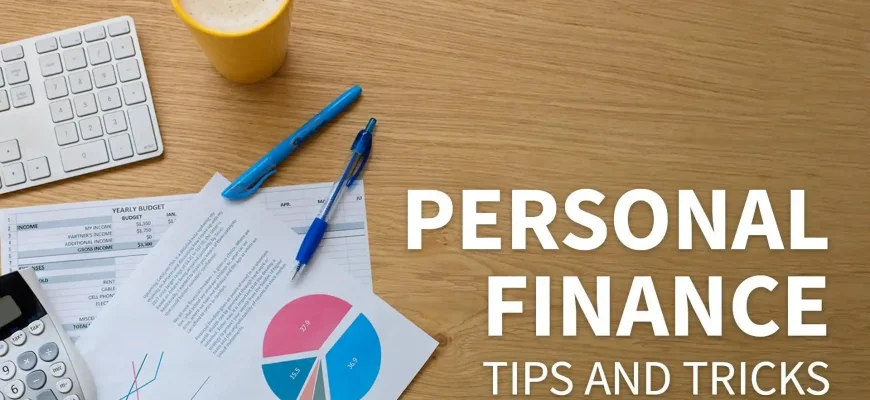When it comes to improving financial habits, it’s easy to get lost in the sea of advice out there. If you’ve ever tried reading a personal finance book, you know what I mean. From budgeting tips to investment strategies, it can feel like you’re drowning in a river of numbers, percentages, and terms that only accountants understand. But don’t worry—this guide will cut through all the noise.
Let’s look at how to improve financial habits, based on hard data, experience, and practical advice that anyone, no matter their income, age, or background, can apply.
Step 1: Understand Your Current Financial Situation
The first step to improving any habit is knowing where you stand. This is true for your finances as well. According to a study by the National Endowment for Financial Education (NEFE), over 50% of Americans have no budget and don’t track their spending. If you’re among them, it’s time to change that.
Start by gathering all the data you can: bank statements, credit card statements, and any other financial documents that show your income and expenditures. The goal is not to judge yourself but to take a snapshot of your financial life. Don’t panic if things look messy. We’ve all been there, and the first step is just awareness.
Why it matters: Research shows that people who track their spending are more likely to have higher savings rates. This is often referred to as the “wealthy habits” effect. If you don’t know where your money is going, it’s hard to change how it’s flowing.
Step 2: Set Clear, Achievable Goals
Once you’ve assessed where you stand, the next step is setting goals. The key here is specificity. Vague goals like “I want to save more” or “I need to stop spending so much” won’t cut it. You need concrete targets—something like “Save $500 a month for an emergency fund” or “Pay off credit card debt in 12 months.”
In fact, research conducted by Dr. Gail Matthews, a psychologist at Dominican University, found that people who write down their goals are 42% more likely to achieve them. It seems simple, but putting pen to paper helps solidify intentions and turns them into actions.
Why it matters: Studies show that people who set financial goals tend to build wealth faster. It gives your efforts direction and makes it easier to evaluate whether you’re on track.
Step 3: Pay Yourself First
You’ve probably heard this one before, but it’s worth repeating: pay yourself first. This means that, as soon as you get your paycheck, you set aside money for savings or investments before paying any bills or making discretionary purchases.
Here’s the science behind it: Behavioral economics, particularly the research done by Nobel laureates like Richard Thaler and Daniel Kahneman, shows that people are more likely to stick to savings habits if they automate them. When you pay yourself first, the savings become non-negotiable. You pay the bills and have fun afterward.
Why it matters: According to the Federal Reserve, more than 40% of Americans don’t have enough money to cover a $400 emergency. Paying yourself first is the antidote to this financial fragility.
Step 4: Avoid Lifestyle Inflation
As your income increases, it’s tempting to spend more. You get a raise, and suddenly you’re eyeing that new car or a bigger house. This is called lifestyle inflation, and it’s one of the biggest hurdles to building wealth.
Research from the Journal of Consumer Research has shown that as people’s income rises, their spending tends to rise at a similar pace. It’s all about the “keeping up with the Joneses” mentality. But here’s the deal: if you can keep your lifestyle stable while your income grows, you’ll be ahead of the game.
Why it matters: According to Deloitte, about 60% of high-income earners still struggle financially due to unchecked lifestyle inflation. A key to wealth-building is living beneath your means—even when you can afford more.
Step 5: Master the Art of Delayed Gratification
If there’s one thing that distinguishes the financially successful from the rest of us, it’s their ability to delay gratification. This doesn’t mean never treating yourself, but rather making conscious choices about when and how you spend.
Studies, such as the famous Marshmallow Test conducted by Walter Mischel, demonstrate that kids who could wait longer for a larger reward were more likely to succeed later in life. The principle applies to finances as well. The ability to delay spending today in favor of long-term goals is a key predictor of financial success.
Why it matters: This principle ties into the concept of “future self.” The more you can prioritize the future you want over the immediate wants of today, the better your chances of reaching financial independence.

Step 6: Invest in Financial Education
One of the best financial habits you can form is a commitment to learning. It’s not just about reading finance blogs (though that’s a good start), but also understanding key concepts like investing, taxes, and retirement planning.
Surveys show that people who take time to educate themselves about money have better retirement outcomes and are more likely to make smarter investment decisions. In fact, a study by the University of Arizona found that just one hour of financial education could lead to better financial decisions, including more consistent saving and investing.
Why it matters: The world of finance can seem overwhelming, but the more you learn, the more empowered you’ll feel. As they say, knowledge is power—and in this case, it’s also wealth.
Step 7: Build an Emergency Fund
You might have heard it a million times, but an emergency fund is non-negotiable. Financial experts generally recommend saving between 3 to 6 months’ worth of expenses. This gives you a cushion for unexpected events like medical emergencies, car repairs, or job loss.
According to a study by the Federal Reserve, only 39% of Americans could afford a $400 emergency without borrowing money or selling something. This is a serious issue, and building an emergency fund is the first step toward financial stability.
Why it matters: Having an emergency fund is the foundation of financial security. It gives you the freedom to make decisions based on opportunity, not fear.
Step 8: Avoid High-Interest Debt
High-interest debt—think credit cards—can be a serious drag on your finances. If you’re carrying debt, make a plan to pay it off as quickly as possible. The interest rates on credit cards can be as high as 25% in some cases, which can make it almost impossible to get ahead financially.
The most effective strategy here is the debt snowball method, popularized by financial expert Dave Ramsey. Start by paying off the smallest debts first while maintaining minimum payments on larger debts. Once the smallest debt is gone, use that money to pay off the next one, and so on.
Why it matters: According to a study by NerdWallet, Americans collectively owe over $1 trillion in credit card debt. High-interest debt is a wealth killer, so paying it down should be a priority.
Real-World Opinions on Financial Habits
Here are a few perspectives on the topic of improving financial habits:
Maria, 32, Spain: “I used to spend without thinking, but once I started tracking my expenses and setting small goals, I noticed a huge change. It’s not about being perfect, it’s about being aware. That awareness helped me save for my emergency fund and start investing.”
John, 58, USA: “At my age, I wish I’d learned about money earlier. But better late than never. I’m currently focusing on paying off the mortgage and saving for retirement. Even though I could’ve started earlier, I still have time to build something solid.”
Ravi, 45, India: “In my culture, there’s a strong emphasis on saving. But I’ve learned that it’s just as important to invest. Once I started putting money into mutual funds and stocks, I saw my wealth grow faster than I ever expected.”
Lisa, 22, Canada: “When I graduated from college, I was overwhelmed by student loans. But once I started budgeting and paying myself first, I felt so much more in control. It feels good to have a plan now.”
Tariq, 60, Kenya: “Financial habits are everything, especially in a place where emergencies can happen without warning. I’ve learned to always have an emergency fund, and I teach my children the same thing. It’s the foundation of peace of mind.”
Conclusion
Improving your financial habits doesn’t require a radical overhaul of your life, but it does require awareness, commitment, and a bit of patience. By understanding where you are, setting clear goals, and automating good habits, you’ll start seeing a shift. Remember, it’s not about perfection—it’s about progress. And, as we’ve seen from the people above, anyone, at any age, can improve their financial situation with the right mindset and strategies.
Happy saving—and don’t forget to laugh along the way!









